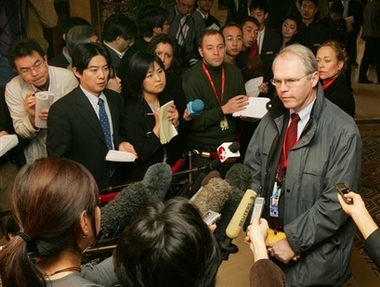Asia-Pacific
The Six-Party talks yield breakthrough
By Qin Jize (China Daily)
Updated: 2007-02-14 07:09
 |
Large Medium Small |
 US Assistant Secretary of State Christopher Hill, right, speaks to journalists before heading out to six-party talks on North Korea's nuclear program in Beijing Tuesday, Feb. 13, 2007. [AP]  |
The Democratic People's Republic of Korea (DPRK) yesterday agreed to shut down and seal its nuclear facility in Yongbyon within 60 days in exchange for energy a process widely seen as a major breakthrough.
Under the deal reached at the Six-Party Talks to denuclearize the Korean Peninsula, Pyongyang will as the first step also accept monitoring from, and verification by, the International Atomic Energy Agency within the timeframe.
|
|||
In return, it will receive an initial 50,000 tons of heavy fuel oil or equivalent of economic and humanitarian aid, Wu Dawei, the chief Chinese negotiator, said in Beijing yesterday.
The DPRK will subsequently take complete measures to irreversibly "disable" its nuclear programs and receive 950,000 tons of fuel oil, or the equivalent in the form of economic or humanitarian aid, from China, the United States, the Republic of Korea (ROK) and Russia.
The 1 million tons of fuel would be worth around $300 million at current prices for Asian benchmark high-sulphur heavy fuel oil, which is used in power stations, shipping and elsewhere.
The joint agreement outlining the initial actions the DPRK will take to end its nuclear drive and the economic rewards it will receive in return was reached after five days of hard negotiations.
All the parties agreed to take coordinated steps to implement the joint statement of September 19, 2005 in a phased manner in line with the principle of "action for action".
Under that agreement, Pyongyang pledged to give up its nuclear program in exchange for energy aid and security guarantees.
According to the new agreement, bilateral talks will start between the DPRK and the United States, and between the DPRK and Japan, to find ways to resolve bilateral disputes and move toward diplomatic relations.
Washington will also begin the process of clearing the DPRK from a list of state sponsors of terrorism.
|
It is an outcome that the international community has waited for far too long. The breakthrough is a profoundly encouraging achievement for the six nations. The new agreement will give fresh momentum to the diplomatic process. |
The initial actions also cover the establishment of five working groups within 30 days on denuclearization, normalization of DPRK-US and DPRK-Japan relations, economic and energy cooperation, and Northeast Asia peace and security.
Meeting with heads of delegations to the talks after the closing ceremony, State Councillor Tang Jiaxuan said the just-concluded session is a major breakthrough and the Six-Party Talks mechanism itself has entered a substantive period.
"The Chinese government firmly supports the document and will spare no efforts to take on its responsibilities," Tang said.
He said the result has once again showed that diplomatic negotiations are the "correct and practical way" to resolve political disputes.
US Assistant Secretary of State Christopher Hill, also the country's chief negotiator to the talks, told reporters: "Obviously we have a long way to go, but we're very pleased with this agreement. It's a very solid step forward."
In Washington, the White House said the agreement is "a very important first step" toward the denuclearization of the Korean Peninsula.
Chinese analysts were pleased with the breakthrough.
Ruan Zongze, a senior researcher at the China Institute of International Studies, described the agreement as a New Year's gift.
He said "Pyongyang and Washington, like the other four sides in the talks, had made great compromises on their positions during Monday's 16-hour marathon-like session", which showed their sincerity to make substantive progress.
He said it is of great political significance that the six parties reiterated that they would fulfil the commitments made in the 2005 joint statement.
Qi Baoliang, a researcher with the China Institute of Contemporary International Relations, said the initial actions are "the first important and concrete steps toward nuclear disarmament, and the agreement charts the direction for future development."
Agencies contributed to the story
(China Daily 02/14/2007 page1)
| 分享按鈕 |
